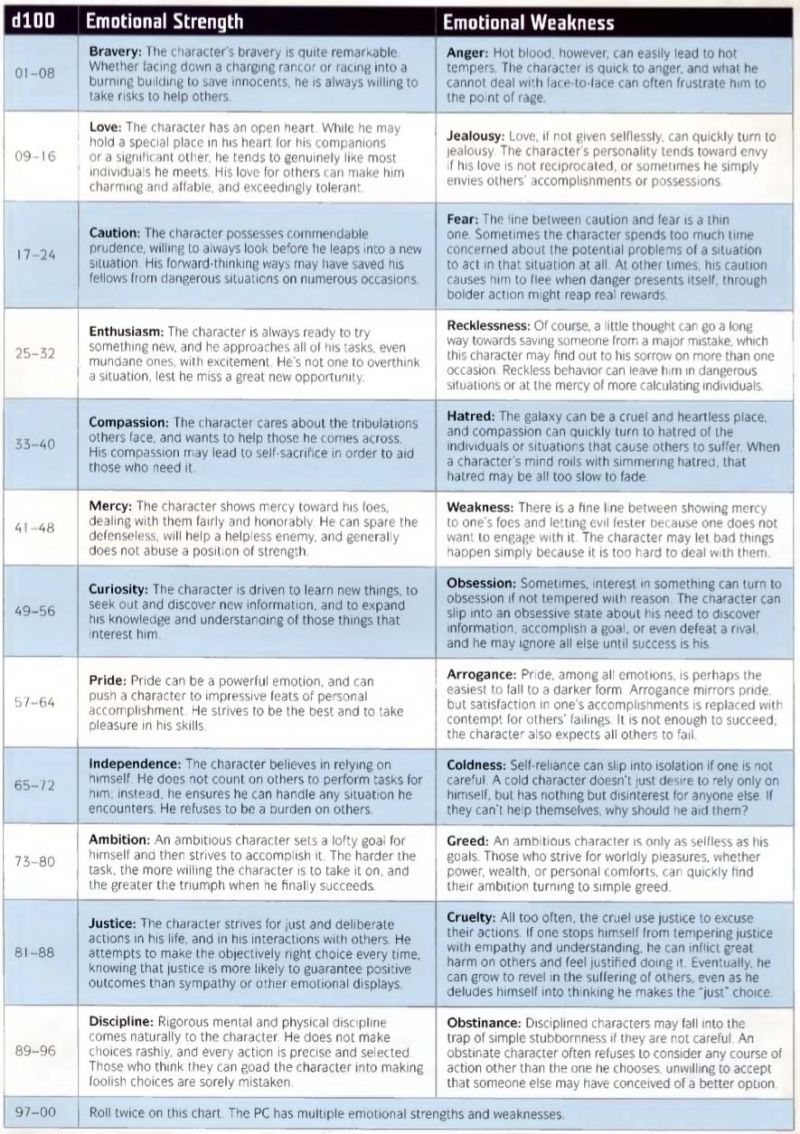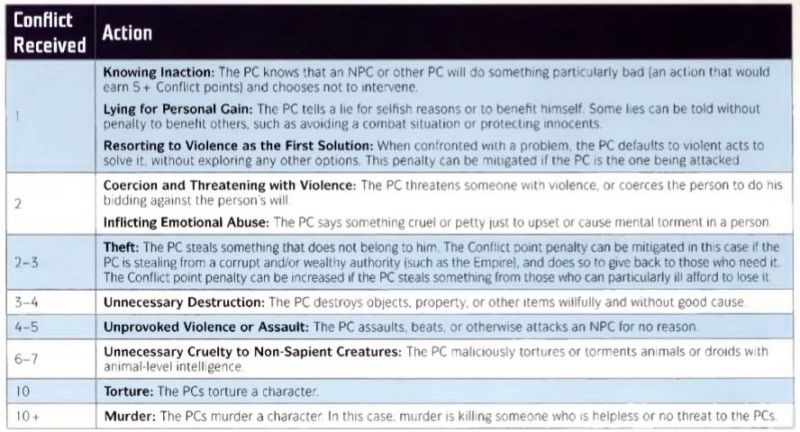SW PC Morality
From OakthorneWiki
Revision as of 00:30, 18 January 2017 by Oakthorne (talk | contribs) (→Emotional Strengths & Weaknesses)
Morality is a trait used by Force-wielders to determine where their experiences cause them to fall on the spectrum between the Dark and the Light Sides. Morality as a game trait is made up of three aspects: a number representing placement on that spectrum, at least one Emotional Strength, and at least one Emotional Weakness.
Contents
The Morality Scale
- The scale of Morality is a number between 1 and 100.
- Player characters begin with a Morality of 50.
- The Dark Side Threshold: Morality 29. When a character's Morality drops to 29 or lower, he has become a Dark Side Force-wielder.
- Force Points: A Dark Side wielder generates Force Points using Dark Side results. The character may still spend a Destiny Point and take one Strain per Light Side result to generate Force Points from Light Side results on Force Dice.
- Destiny Pool: At the beginning of a game session, for each character in a group that is aligned with the Dark Side, flip one Light Side result to the Dark Side.
- Thresholds: At Morality 19, a Dark Side Force-wielder's Strain Threshold is decreased by 1, and his Wound Threshold increased by 1. At Morality 9, they are decreased and increased by another 1 point each.
- Redemption: A character remains a Dark Side user even if his Morality rises above 30 again. In order to achieve redemption, the character must achieve the Light Side Paragon Threshold, and go through mystical/spiritual trials to achieve redemption.
- The Light Side Paragon Threshold: Morality 71. When a character's Morality rises to 71 or higher, he becomes a Light Side Paragon if he is already aligned with the Light Side, or achieves the possibility of Redemption if he is Dark Side aligned.
- Destiny Pool: At the beginning of a game session, for each character in a group that is a Light Side Paragon, add one Light Side Destiny Point to the pool.
- Thresholds: At Morality 81, increase a Force-wielder's Strain Threshold by 1. At Morality 91, it is increased by another point.
Emotional Strengths & Weaknesses
| d100 | Emotional Strength | Emotional Weakness |
| x | Bravery: Your bravery is remarkable, always willing to face down dangers to accomplish your Motivation. | Anger: Your fury is notable, and you are quick to anger - particularly when it comes to your Motivation. |
| x | Love: You have an open heart, with a few you feel very deeply for, and a general good-nature when it comes to almost everyone else. Your strongest feelings are usually attached to your Motivation in some way. | Jealousy: You are selfish with those people and things you care about - they are yours by right, and you don't tolerate threats to that. You are most jealous where your Motivation is concerned. |
| x | Caution: You possess commendable prudence, always careful of danger and on the look-out for trouble. You are most cautious where your Motivation is concerned. | Fear: Terrible dread and cold nightsweats are a regular part of your reality. Your concerns are most apparent around your Motivation. |
| x | Enthusiasm: x | Recklessness: x |
| x | x | x |
| x | x | x |
| x | x | x |
| x | x | x |
| x | x | x |
| x | x | x |
| x | x | x |
| x | x | x |
| x | x | x |
| x | x | x |
Conflict Generation
- Conflict is generated in one of two main ways during play.
- Dark Side Results to Generate Force Points: If a Light Side aspected Force-wielder spend a Destiny Point to turn Dark Side results on a Force Die roll into Force Points, they also gain 1 Conflict per Dark Side Result so utilized. (The reverse is true of Dark Side characters who use Light Side Results.)
- Conflict-Generating Actions: Certain actions ripple through the Force, introducing dissonance. Though all such actions do so, the actions of Force-wielders generate greater disharmony. Some examples include:
Increasing & Decreasing Morality
- At the end of a game session, a player character whose character has accrued any Conflict rolls a single d10.
- If the result of the roll is greater than total Conflict, the player increases their Morality by the difference. (Conflict of 7 and a roll of 9 increased Morality by 2.)
- If the result of the roll is less than total Conflict, the player decreases their Morality by the difference. (Conflict of 7 and a roll of 5 decreases Morality by 2.)
- If the result of the roll is exactly equal to total Conflict, the character neither increases or decreases Morality.
Triggering Morality
- At the beginning of a game session, the GM rolls 1d100.
- Whosever Morality is closest to the number rolled is considered to have a Triggered Morality.
- The player's character with the Triggered Morality is "haunted" by their Emotional Strengths and Weaknesses during that game session, and should make a point of roleplaying that.
- At the end of the game session, the Triggered character's increase or decrease in Morality is doubled.

